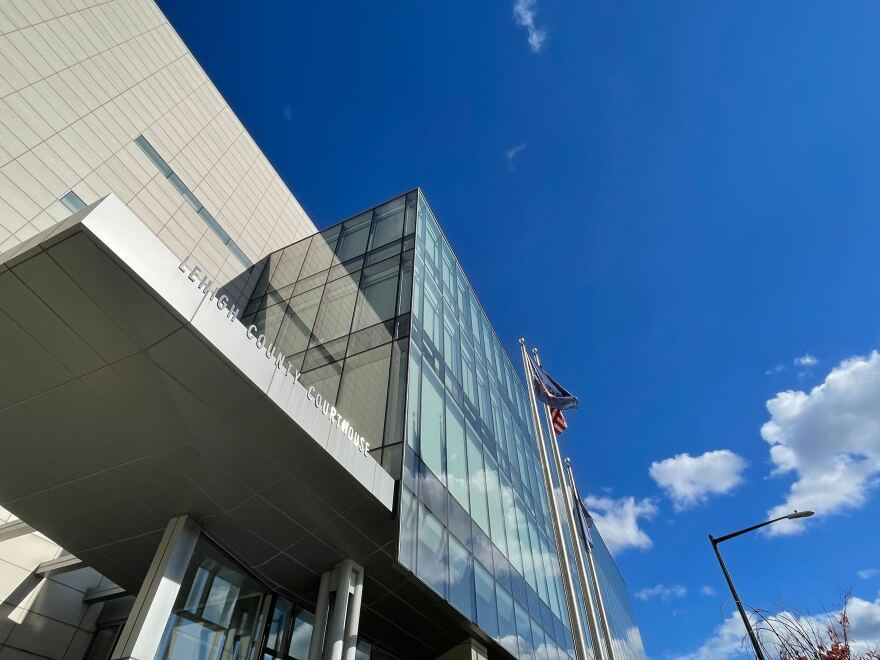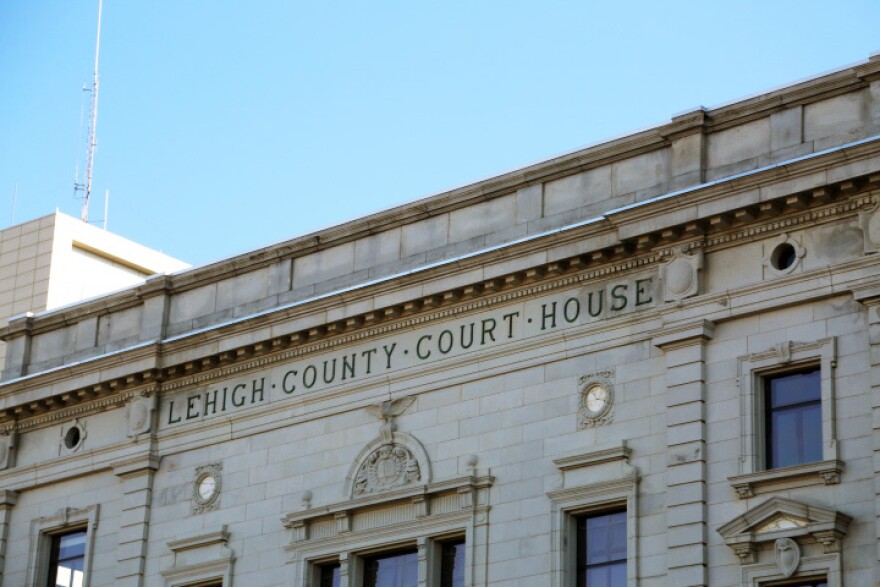ALLENTOWN, Pa. — Lehigh County is at a crossroads of what to do with juvenile detention.
The county closed its juvenile detention center in 2014 after nine years in operation, citing declining admissions.
It provided 48 beds of "ample housing and programming space for local detainees who are awaiting further disposition by the courts."
Since then, the county has housed detained youth in other counties' facilities, such as Bucks and Northampton, paying them to provide the services.
"We can't find beds."Lehigh County Chief Juvenile Probation Officer Kevin Miller
Lehigh County's building has been converted to the general services annex.
However, in recent Lehigh County commissioners Courts and Corrections Committee meetings, concerns about not having enough beds for detention and treatment for juvenile court cases have brought the need for some kind of action to the table to discuss.
"We can't find beds," county Chief Juvenile Probation Officer Kevin Miller said in May.
"Just as an anecdote ... we had 10 kids who should have been detained in the first four months of this year, but we weren't able to find a bed," Miller said.
"So we put them on GPS, we tried to put them in shelter care. So we have to come up with other ideas."
County officials say the average daily population for Lehigh County is six or seven.
Discussions to regionalize service
Juvenile detention services involve the stay of high-risk juveniles before court sentencing.
That includes placement in facilities such as group homes or more secure correctional facilities, or probation.
"We're all part of the system. I think that ... creates a school-to-prison pipeline, which is alive and well."Lehigh County Commissioner Jon Irons
Commissioner Jon Irons said the issue is pivotal, both for the future of the county in terms of budgets and planning, but also for young people in Lehigh County.
"Personally, this issue is close to me," Irons said. "I know that the failures in our system starts in their homes, it goes through our schools, it lands here in our local governments.
"We're all part of the system. I think that ... creates a school-to-prison pipeline, which is alive and well."
He said he hopes to craft a plan that reduces the negative impact of detention, and can ultimately end the county's role in the "school-to-prison pipeline."
Irons said the state will not take it on the issue of bed demands, and that it has been left as a regional issue for counties to solve.
'Longstanding challenge'
And so Lehigh County has been in discussion with some of its neighbors.
"The option for us to build our own facility would not be financially wise," Lehigh County Director of General Services Rick Molchany said.
"We are looking to regionalize with Berks and Dauphin counties. The essence of this regional plan will be serving the judiciary needs of Allentown, Reading and Harrisburg."
"Our goal is to move from detention to treatment."Lehigh County Director of General Services Rick Molchany
Currently, Molchany said, detention stays for Lehigh County average 22 days. In 2024 so far, about 50 juveniles have been detained.
He said the state government supports regional efforts, but not those of individual counties. He said the discussions are in preliminary stages,
"Our goal is to move from detention to treatment," Molchany said in an email, noting the county's current community service-based program for juveniles that provides tutoring and therapy.
"Treatment structured stays are on average about 120 days. This is the opportunity for lasting behavior improvement."
Irons, chairman of the commissioners Courts and Corrections Committee, assured in an email that there's nothing immediately on the table.
But Irons he said there is a "longstanding challenge with the available juvenile detention beds in our region and a need for a long-term solution."
Molchany said no final costs have been officially projected.
Raising concerns
A report by the Pennsylvania Juvenile Court and Judges' Commission published in May 2023 lists that Lehigh County's average daily population for juvenile cases was 6.22 at the time.
"So the end result will be they won't visit their kids."Attorney Ed Angelo
Many virtual attendees at a meeting of the courts and corrections committee on Aug. 7 raised caution about expanding the number of beds, and the challenges of transportation and cost related to regionalization with Berks and Dauphin.
"Most of my clients who wind up in detention over the years that I've done juvenile justice are poor, almost always, often they don't even have a family vehicle," Attorney Ed Angelo said.
"So the end result will be they won't visit their kids."
Many bristled at the idea of potentially millions being spent on new facilities and instead encouraged more money into diversion, after-school programs and treatment for substance-abuse issues.
County staff assured that preventative work was being done.
Northampton also seeing concern
Northampton County Juvenile Justice Center at the time of the Pennsylvania Juvenile Court and Judges' Commission report had an operational capacity of 12, a licensed capacity of 36, and a building capacity of 85.
Molchany said that because of current staffing, the Northampton center is not able to take Spanish-speaking juveniles.
Northampton County's Juvenile Justice Center also has seen a staffing and operational bed shortage to the point where it has been turning away children from outside of the county seeking placement.
In April, that was at a rate of two to four youth a day, Northampton County Court Fiscal Administrator Badaoui Boulos said.

According to officials, nearby Bucks County facilities currently contract with 16 other counties, also contributing to difficulty in securing spots for detained youth.
"The most prevalent concern for us here in Lehigh County is that we are one of 57 counties who will vie for beds at six different facilities," Miller said.
"Out of those 57 counties, there are only 200 licensed beds, and we only have access to 102 of them."
In June, commissioners passed a new service agreement with the Bucks County Youth Center to detain juveniles from Lehigh County at a rate of $650 per resident day.
State bed gap in a 'crisis situation'
That same report illustrated a gap in beds to current projected needs not just in the Lehigh Valley, but throughout the state.
It states that Pennsylvania law and guidelines state the secure detention of juveniles is authorized for brief periods and for very limited purposes, and should only be used after less restrictive alternatives have been considered and rejected.
The report states that admissions to secure juvenile detention centers declined 55% from 2018 to 2022 because of the impact of COVID-19 and alternatives such as evening reporting centers.
"In an increasing number of jurisdictions, however, access to secure detention beds is down. Furthermore, when detention beds are available, the facility is oftentimes hours away, which limits the contact juveniles have to their attorney, their family, their schools and other community services."Pennsylvania Juvenile Court and Judges Commission report
However, despite this, the report argues that there's what can be called a "crisis situation" regarding juvenile detention beds and access to them by communities throughout the state.
"In an increasing number of jurisdictions, however, access to secure detention beds is down," the report says.
"Furthermore, when detention beds are available, the facility is oftentimes hours away, which limits the contact juveniles have to their attorney, their family, their schools and other community services."
As of April 2023, only 13 facilities are providing detention services in Pennsylvania, and some counties in Western Pennsylvania use facilities in Ohio.
Six of those are in the Southeast region including Bucks, Berks, Lehigh, Northampton and Philadelphia counties.
Facilities closing statewide
From 2006-21, 15 detention facilities throughout the state closed operations.
Overhead costs also increased in recent years, due in part to U.S. Centers for disease Control compliance requirements. Staffing shortages affected many locations during the COVID-19 pandemic too.
The total number of secure detention beds licensed by the state at the time was 517, with secure staffing allowing for only 404 beds.Pennsylvania Juvenile Court and Judges' Commission report
According to the report, the total number of secure detention beds licensed by the state at the time was 517, with secure staffing allowing for only 404 beds.
The report states that the median length of stay also has increased throughout the state, further limiting the availability of beds.
Statewide, projected needs were placed at 412, while current operational capacity was estimated at 404. Licensed capacity is 517.
The Northeast region has a projected need of 22, despite having none of its own facilities.
The Southeast region, including Philadelphia, Reading and the Lehigh Valley, has a projected need of 256 and a projected availability of 316.


